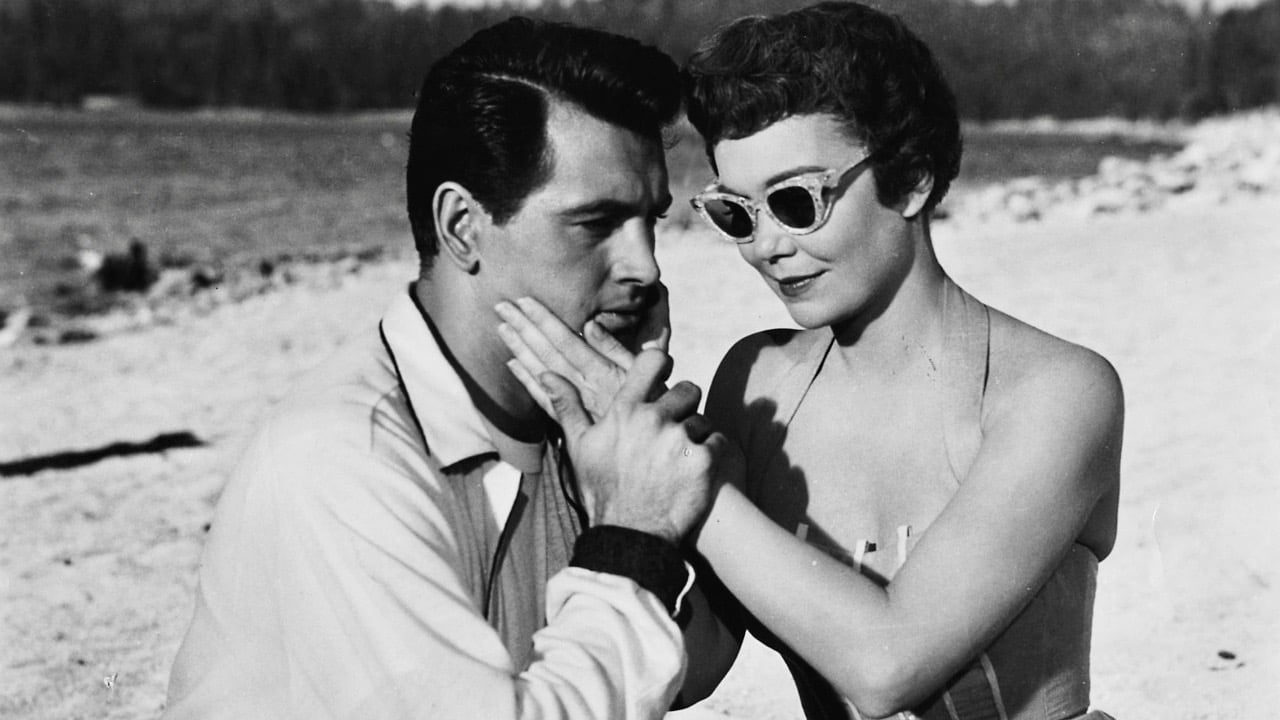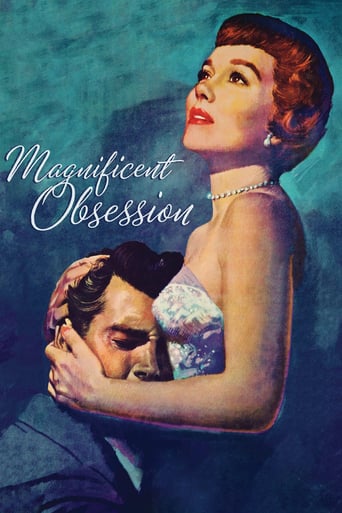

I did something really insane last night: I took out of the local library The Criterion Collection of "Magnificent Obsession" thinking I was only getting the 1954 remake. However when I got home I discovered I had both versions, Jane Wyman's and Irene Dunne's 1935 original. Now this is where I ought to have my head examined because I decided to watch both movies one right after the other! I am still reeling. Here's the plot: Helen is married to a doctor who dies because medical equipment that could have saved him was unavailable because it was being used to resuscitate selfish playboy Bob Merrick. When Bob tries to make it up to Helen he inadvertently causes her to have an accident which blinds her! Hopelessly in love with our sightless heroine Bob decides to go to medical school to become a surgeon so he can perform the operation that will restore her sight! I am not making any of this nonsense up. Though I love Irene Dunne the Jane Wyman remake is the better of the two films not so much for Jane (Hollywood's dullest leading lady) but for Douglas Sirk's lush direction and an over the top musical score. Plus you get to see a gorgeous Rock Hudson naked from the waist up! This is sheer movie lunacy but if you must watch do yourself a favor and only view one of them at a time! Otherwise you risk losing your mind. I almost lost mine!
... View MoreHow to sum up this expensive soap opera? If you can sit through it without either falling asleep or laughing, you're the kind of person who needn't ask for an anaesthetic before your next root canal. I mean -- there is such a thing as going too far, and they have gone it.The photography is splendid -- Big Bear and Arrowhead Lake -- in glorious 1950s Technicolor overreach. The lighting is flat, as it was in the television productions of the period, such as "I Love Lucy." The acting is magnificently abominable. Rock Hundson as a reckless multi-millionaire who believes that, if there is trouble, writing a check for a large amount will make it go away, simply doesn't do the job. He's very handsome at the beginning as a self-testing speedboat racer but was unconvincing. Then, having grievously wounded Jane Wyman, he suffers an unanticipated road to Damascus experience. His reformed playboy is even worse.Nobody stands out. Otto Kruger is always reliable, whether a suave villain or, as here, an understanding and tolerant mentor to Hudson's emotional life. However, he's knee-capped by a stereotypical part -- the sensitive non-materialistic artist -- and it thereby turned into a figure with the animation of a statue in Disneyland's animatronic Hall of Presidents. Maybe Calvin Cooledge.The music is full of heavenly choirs, a sure sign that democracy is failing. The nobility of Beethoven's Ninth, already overused, is mutilated by a thousand and one throbbing vocal chords.I realize Douglas Sirk directed this and that he has a cult following. I don't know why.
... View MoreBecause now we've got Technicolor, Widescreen, Ross Hunter, Douglas Sirk, and more importantly, Rock Hudson. He takes on the practically impossible task of playing this sinner-to-saint transformation, and almost makes it work, if not totally. Jane Wyman lacks the youthful effervescence of Irene Dunne from the original, but gives a beautifully restrained performance nonetheless. Otto Kruger expands on Ralph Morgan's role of the artist (here a painter instead of a sculptor) who expresses the film's moral.This being a soap opera like premise, it is more than appropriate that the film focuses on two "Guiding Light's", Kruger and the compassionate nurse, played her by Agnes Moorehead who fortunately gets to be somewhat tough in her duties, yet kindly compassionate under that Endora red hair of hers. Barbara Rush adds some more layers to the sweetness of her stepdaughter character.Hudson and Wyman at first seem an odd couple to be paired with in a spiritual secret storm mean to give the matinée ladies a good cry away from the daily viewings of "Love of Life" and "Search For Tomorrow", and the film rises above the stories clichés. Made on the success of another film version of a Lloyd C. Douglas novel ("The Robe"), this takes the life lesson of being kind and helpful to strangers without expecting anything back in return to a modern level. It utilizes beautiful locations and a lush musical score to flesh out its already melodramatic tale. In an era of exotic beauties like Monroe, Taylor, Loren and Lollobrigida (or down home girls like Doris Day), Wyman's box-office success with this is a nice reflection on the 1950's environment where a box in a living room was sometimes keeping people from going to the movies, except, like in the case of this movie, when they really had something worth going to.
... View MoreDouglas Sirk is often praised some 50 years after his career ended for being one of the most subversive and bittersweet of Hollywood directors of the 1950s. Born in Germany, he began his film career in the German cinema, only to flee when the Nazis took control. By the mid 1940s, he was a full-fledged Hollywood director assigned by studios to churn out as many films as possible. However, even after all these years, it is clear that like fellow immigrant directors Billy Wilder and Ernst Lubitsch, there was a dark undertone in all of Sirk's works that continues to amaze today.The first of Sirk's most well-known films was Magnificent Obsession, a glossy Technicolor melodrama that on the surface appears to be as soapy and exploitative as any daytime television drama. However, many critics and scholars in recent years have instructed us to look closer, to try and understand the hidden meanings and undertones of such a story. Clearly, it is obvious that Sirk used such a decor and platform as that was what he was given to work with. Melodramas were becoming quite popular in the 1950s, this itself being a reflection of the growing artifice and superficial decadence that would come to characterize postwar America. Sirk, being a European immigrant, would know and recognize this better than almost anyone. Therefore, he brilliantly used American settings, characterizations and story lines to subject to American audiences the very ideas and social graces he saw through. Just as expected, people fell for the bait and came in droves to witness what they though was simply a tearjerker exploring the relationship between a spoiled rich playboy and a well-meaning widow of a revered doctor.Though it may be impossible to truly grasp all of Sirk's secrets after just one viewing, it seems to me that one of the critiques most notable here is the motivation these characters possess. Another reviewer described this film as a quest for spirituality. Redemption and understanding may also be added to this list as nearly all of these characters attempt to find consolation and faith in things that reflect their own artificial emotion and feelings. Do any of these characters truly have a moral center that guides their everyday actions? Or are they simply living out of guilt, fear, jealousy and self-loathing? These are loaded questions to be sure, but the more I write the more I am convinced that Magnificent Obsession is a loaded film.
... View More